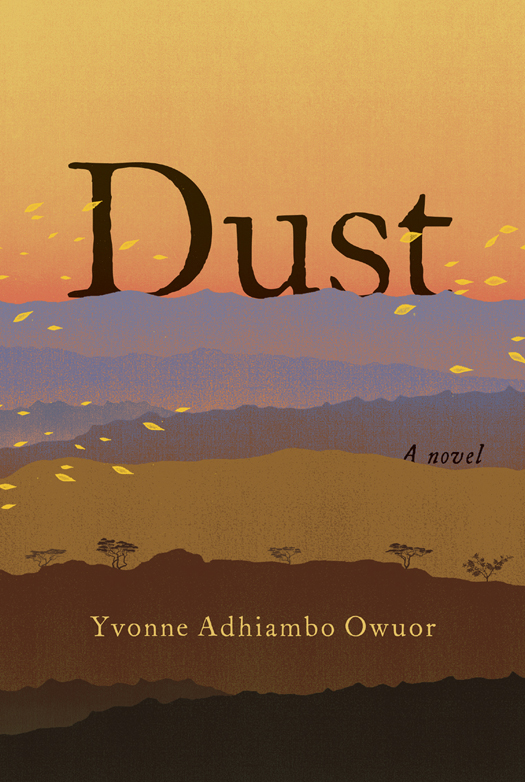
Dust
کتاب های مرتبط
- اطلاعات
- نقد و بررسی
- دیدگاه کاربران
نقد و بررسی

Starred review from November 4, 2013
This evocative debut historical novel of Kenya tracks the slow unraveling of the Oganda family after the murder of beloved son Odidi at the hands of Nairobi’s finest. Before he can be buried, Odidi’s devastated mother takes flight, leaving her picturesque home in a remote northern province. Meanwhile, Odidi’s grieving sister, Arabel Ajani, must confront the Ogandas’ demons. Caine Prize–winner Owuor’s prose, though sometimes too sentimental, is both quixotic and archly descriptive. And while the author may spill a great deal of ink exploring her protagonist’s consuming passions and “the kernel of all their deepest yearnings,” her writing is exceptionally chiseled and achieves a poetic dimension. Odidi had an “addiction to water songs—a liturgy of flowing, bubbliness. Even the camels listened to him. Rock-drill laughter, excavating terror; salt in soup; no sugar in tea made from rangeland herbs.” The author is as at ease evoking the mystical, inflamed Ogandas and the magical Northern Frontier District as she is deconstructing a family of British expatriates, the Boltons, whose destiny intersects with Odidi’s. “The country chose its prey. Seduced them, made them believe they owned it, and then it gobbled them down, often in the most tender of ways—like a python.” There is hardly any aspect of Kenya that Owuor seems unable to tackle with her unique flair in this masterfully executed novel, from the mid–20th century’s Mau Mau rebellion and its aftermath to the stirring personal destinies of her sundry cast of characters.

November 1, 2013
A brutal death in Nairobi prompts a reunion of the victim's family and unlocks a host of troubling memories. The center of Owuor's moody debut novel is Ajany, a young woman who returns to her family's northern Kenya homestead from Brazil after learning that her brother Odidi has been gunned down in the midst of post-election violence. (The novel is set in 2007, when the turmoil there left hundreds in the country dead and tens of thousands displaced.) As their father and estranged mother reconvene in Wuoth Ogik ("the journey ends"), their efforts to mourn in peace are soon upended. Chief among the disruptions is Isaiah, an Englishman whose father's books fill the house in Kenya. Both he and Ajany's father provide an opportunity for Owuor to explore the previous generations' violence in the country, which she evokes in harrowing detail (family members' military adventures in Burma in particular). But the novel's strength is in the present, particularly as Ajany travels to Nairobi to uncover the circumstances behind Odidi's murder. And there, Owuor explores how layers of corruption threaten to overwhelm the sense of social justice among its citizens and how Westerners oversimplify the country's predicament. Ajany's character might be more effective were her back history in Brazil less sketchy, but Owuor intentionally keeps the novel's tone impressionistic and indirect. Though that can make it harder to keep the plot lines straight, the prose has an appealingly rough-hewn poetry, built on clipped sentences and brush-stroke evocations of the dry landscape. ("The Kalacha dusk will soon descend in colors borrowed from another country's autumn.") Owuor, the 2003 winner of the Caine Prize for African Writing, has style to spare, which more than compensates for the looseness of the narrative.
COPYRIGHT(2013) Kirkus Reviews, ALL RIGHTS RESERVED.

Starred review from October 1, 2013
From the moment Odidi Oganda is gunned down on a Nairobi street, this stunning debut novel by the Caine Prize- winning Owuor grabs the reader's heart, refusing to let go. Blending short, staccato bursts of words with long, sensuous, prose passages, Owuor lays bare the tumultuous history of Kenya through the lives of Odidi's parents, Nyipir and Akai-ma, and his beloved sister, Ajany. Home from a self-imposed exile in Brazil, fueled by the madness of her grief, Ajany attempts to resuscitate Odidi by reconstructing the last ten years of his life. In doing so, her path crosses that of an equally despairing Englishman, Isaiah Bolton, wandering through Kenya in search of a father he's never known but whose name, Hugh Bolton, resonates with the Ogandas. Their families' secrets mimic those of the citizens of Kenya, whose lives are torn apart by repression and torture. Each fully formed character in this relentlessly sorrowful novel evinces a palpable longing for connection, and as the past unfolds, understanding evolves, anger dissipates, and tears of anguish and relief water the dusty land. VERDICT Owuor represents another shining talent among Africa's young writers publishing in English. This searing novel, though informed by her Kenyan roots, should not be pigeonholed. These unforgettable characters and universal themes will speak to all readers who seek truth and beauty in their literature.--Sally Bissell, Fort Myers, FL
Copyright 2013 Library Journal, LLC Used with permission.

November 1, 2013
Set in arid northern Kenya amid the political turmoil of the latter half of the twentieth century, this powerful first novel will evoke references to William Boyd and even to Graham Greene and Joseph Conrad. From the dramatic prologue in which Odidi Oganda is killed in a hail of bullets, to his sister Ajany's investigation of his life and death, author Owuor shifts back and forthfrom the Mau-Mau movement (in which Odidi and Ajany's father, Nyipir, may have been complicit), to Kenya's postindependence hopes and horrors, to the near-present, taking in along the way bloodshed, betrayal, and the critically tragic assassination of Tom Mboya in 1969, after which, we are told, Kenya's official languages became English, Kiswahili, and Silence. The Oganda family's relationship to the English colonialist Boltons, including sire Hugh, whose life had crossed Nyipir's, is at the center of this compelling saga. When Hugh's son Isaiah comes to Kenya to trace his father's fate, the intersection of his activities with Ajany's becomes the driving center of this important addition to the literature of contemporary Africa.(Reprinted with permission of Booklist, copyright 2013, American Library Association.)

























دیدگاه کاربران